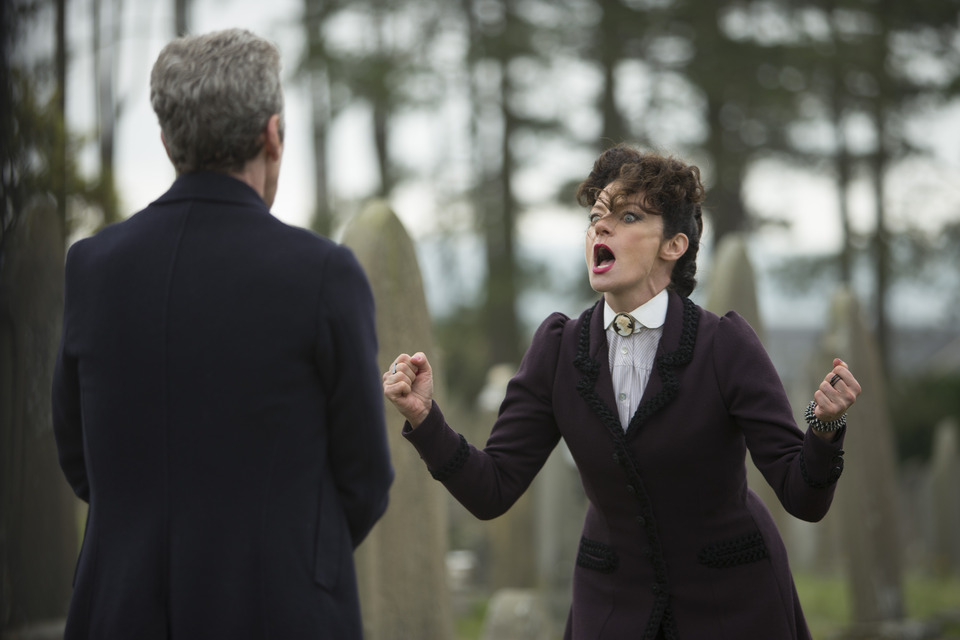Peter Capaldi and Michelle Gomez in BBC America’s “Doctor Who”
We said earlier in this season (more than once) that if Steven Moffat managed to pull off what he appeared to be attempting; if he really stuck the landing on the questions he was asking and the situations he was setting up, then we would have no problem calling this season of Doctor Who damn near genius in its execution. So did he manage it? Is he a genius?
Sort of and maybe.
And thus our coverage of Doctor Who Season 8 comes to a close. See you next month for the Christmas special, Whovians!
.
.
.
.
.
.
.
Psych.
Okay, here’s what we got with the season 8 finale: a genuinely tense story with some absolutely devastating emotional beats (some of the best written in series history, in fact), a highly entertaining villain, a well-executed tying up of themes, a whole bunch of pure narrative nonsense, people doing things that make no sense, and a story that should have major worldwide repercussions of disastrous proportions, but experience, intuition, and that “final” conversation are telling us it probably won’t.
It was a mess, really; which makes it no different from … plenty of Nu Who season finales (“Last of the Time Lords,” “The End of Time,” “The Wedding of River Song)” or culminations of long-form story arcs (“The Angels Take Manhattan” or “Journey’s End”). In fact, so much of it was a mess that we’ll have to point out all the problems in bullet format because trying to write them all out in paragraph form would keep us all here all day:
• The science was WONKY AS HELL. In fact, it was so nuts that you might as well have handed Missy a magic wand to explain how she managed to make it rain Cybermen.
• The power of Twu Wuv saves the day once again. It’s one of the themes Moffat has been positively OBSESSED with during his tenure and it is way past the point of being played out. In fact, one of the good things about this season is that it succeeded in being different from the prior three in many surprising ways. To have that moldy old theme pop up during the climax (not that we didn’t see it coming) was one of the flatter moments of the story.
• “President of Earth” is one of the dumbest things the show’s ever done in the modern era. It was so dumb it actually makes us wince a little thinking about it. We’re fine if the show takes a rather naive and simplistic view of world politics, but considering the dark nature and complex themes this episode was exploring, everything from the second UNIT showed up until the TARDIS landed in that graveyard was a silly, embarrassing waste of time. And don’t give us “It’s a kid show” as a defense. We’d imagine the average 12-year-old in Great Britain would laugh at the idea of any of the world super-powers agreeing to voluntarily turn total control of the planet over to an alien from outer space to save it from another alien from the same planet as the first one. Sure, that makes sense. “General Zod is attacking! Superman, you are now KING OF THE WORLD. Save us!”
• People doing really dumb things because someone thought it looked cool, we guess? Why would Kate show up with an old Cyber-head, like that? There’s a major national security operation under way and she’s lugging a huge, heavy prop around so she can make a joke to a creature who has no emotions? And then, in order to execute a smooth transfer of power to the new President of Earth, she drugs and kidnaps him in full view of the public? Sure, that makes sense. And now that we’ve confirmed this iteration of Cybermen can fly, let’s get Mr. President in an airplane as a precaution. Also: Osgood is like this total genius that impresses even The Doctor with her intelligence and deduction. So of course she falls for the “Come here, I want to whisper something to you” ploy from the homicidal maniac who is, for some reason, being kept ten feet from her while she’s trying to work. Also, the UNIT security detail is apparently manned by very slow-moving dimwits.
• Massive alterations to the status quo that will NEVER BE ADDRESSED. “Everyone who ever lived, man, woman, and child, is now at my command.” Holy cow, did no one during the writing process take the time to consider what happens to the people of earth after EVERY SINGLE GRAVE ON THE PLANET IS DESECRATED AND EMPTIED OUT? So Amy Pond, Rory Williams and Sarah Jane Smith all just got turned into Cybermen before exploding in the skies over earth. Chew on THAT for a second. Because it seems pretty obvious that no one else did during the writing stage. Not to mention the fact that all of humanity just got a rather dramatic and explosive confirmation on the one question that has plagued us since we walked upright: is there something after death? Turns out? There not only is, but it can be exploited by evil people to mutilate you and make you suffer long after you’ve died. Someone just did it to every dead person you ever knew. Someone just did it to every dead person EVERYONE ever knew. What is the likelihood that this will ever be addressed in any meaningful way?
But despite these rather overwhelming (and in many ways, very familiar) problems, we didn’t find ourselves nearly as frustrated as we probably should have been. Because even with all of its flaws, it’s a story that managed to land all of its points and emotional beats. It’s a story that did what it set out to do; which was:
1) To define this new Doctor in a manner more declarative and more in-depth than almost any previous iteration of the character.
2) To explore the darker side of being a human companion to The Doctor and what that can do both to one’s own psyche as well as the relationship one has with the rest of the world outside the TARDIS.
3) To respond directly to some of the criticisms leveled at the previous season, as well as the creation of Clara, the casting of Capaldi, and Moffat’s history of problematic depictions of women.
Is Moffat a genius? Well, no. That’s probably too strong a word (and one that tends to get tossed around too freely), but he’s definitely someone who deserves a hell of a lot of credit for what he’s accomplished here. It’s a very difficult thing for a show to change course in its style and goals so abruptly and under the same leadership. Season 8 is as different from seasons 5 through seven as it possibly could have been under Moffat’s direction. We can’t help but respect him for working as hard as he obviously did to produce something unique in the show’s history. Not that going dark or exploring character themes are new to Who, but no one’s ever attempted them on this scale. And no one’s ever made such a 180 in approach to do it. We couldn’t help but be struck, watching that horribly painful confrontation between Clara and undead Danny, that this was written by the same man who gave us the Amy Pond and Rory Williams romance, which was about as over-the-top goopy at times as you could ever want – and which also came to its narrative end in a graveyard. “I love this man so much I will risk death to be with him” has been turned into “Your screwed-up love hurt me so badly I just want you to kill me.” Amy Pond knew exactly when to say goodbye to the Doctor and did so. Clara waited too long and this was the result. They are, in retrospect, a study in opposite approaches to being a companion.
Which brings us to our next point, this was one of the most thematically tight of any TV seasons we’ve ever seen. The very questions and issues that defined the finale were stated early in the season, followed up on throughout each of the ensuing episodes, and paid off in the finale: whether the Doctor is a good man; his disdain for soldiers; “Do as you’re told” and Clara’s tendency to be a control freak; the difference between an officer and a soldier; the danger of becoming too much like the Doctor and how he is defined by his ability to lie. This was as clear-minded an execution as you could ask for in a TV season. Even if you don’t agree with what he did or how he did it, you have to admit he had a very clear plan and stuck with it all the way to the end. Has that ever been the case with Moffat, even in his best seasons of the show?
So who is The Doctor? After all that setup, what is the answer to the question this season posed? In what we would consider a strong tip of the hat to having a Doctor with Peter Capaldi’s face, the answer is the kind that only comes with age and experience. Because nothing is stronger indication of a person’s wisdom than how well they understand how little they know. “I’m an idiot!” he says gleefully, and in total defiance of the previous Doctor’s tendency for self-aggrandizing speeches about being the Oncoming Storm. The previous several Doctors were PTSD-afflicted men going through mid-life crises. This Doctor has come out the other side and knows exactly who he is right now, in the confident and unpretentious manner that comes with age. He’s neither a good man or a bad man and he’s definitely not a hero. That’s a level of baggage and responsibility he could do without at the moment, especially after the centuries of acting like the universe’s defender. For now, this Doctor sees himself as “an idiot with a box and a screwdriver, passing through, helping out, learning.” It’s a wonderful take, and an organic shift away from what he’s been for the entire run of Nu Who.
As for the second big question of the season, who is Clara? Clara is the female Doctor so many of you asked for. Now, that could be seen as a pretty damning thing, since Moffat could be saying that a female Doctor could be disastrous. Maybe we’re giving him too much benefit of the doubt, but we don’t think that’s quite it. We do think there was a lot of deliberate gender-bending motifs playing out in order to address the charge that he does a poor job of writing women. Missy was definitely created in response to the idea that this Doctor should have been female. Maybe Moffat needed to work his way through this story in order to come to the point where he could accept a female Doctor. We don’t think it was a coincidence that this finale was loaded with women characters who were all given a scene to define themselves, just as we don’t think it was a coincidence that both Clara and The Doctor mused over the idea of him ruling Gallifrey as a queen, instead of a king. If we really wanted to pretend we know what’s inside Moffat’s head, we’d say this was his way of saying “I’m not going to be the one to give you what you asked for, but I’ll lay the groundwork for it to come down the road.” We’re impressed by that.
As for Clara, she’s less a commentary on the idea of a female Doctor and more of wink at it, especially with that credits sequence, which was a lot of fun to see. Her real role was, as we said, to explore what happens to companions who stay too long. While we were impressed by how much she knew about the man after all this time (including the number of wives he had, the fact that he presumes all his children and grandchildren are dead, and in the most surprising callback of all, the reminder that he has a genetically cloned “daughter” wandering the universe somewhere), the takeaway here wasn’t the intimacy or long shared history of the two characters, it was how he turned her into a liar as well as someone very bad at interpersonal relationships; i.e., a female version of the Doctor. In other words, Clara’s not a commentary on what happens when a woman becomes the Doctor. She’s merely a reflection of what The Doctor is and always has been: not a good person or a bad person or a hero. Just a young woman walking alone, having paid some very heavy prices for becoming addicted to adventure.
Some final random thoughts in (What else?) bullet format:
• Moffat has been accused of undoing or ignoring the work of Russell T Davies, but we suspect that’s not a very fair charge to make now. He clearly believes that when the Doctor regenerates, it’s a chance to make a comment about the Doctor before him and (to get a little poetic about it) rotate the diamond to catch the light on a different facet of the character. The Man Who Regrets (10) became the Man Who Forgets (11), for instance. But with this season, he’s shown that he’s willing to remake the character or undo previous stories, even when it’s his own work being changed.
• The long-term character arc from Nine through Twelve has been that of a former soldier working his way through the universe’s worst case of PTSD, becoming more manic and child-like with each regeneration, until he snaps out of it to become the cranky, soldier-hating old vet.
• Danny was an underdeveloped character right up to his end, who came off a bit of a jerk when the story was trying to portray him as heroic. We understood the pain and bitterness he might have felt at the end (and again, kudos to Moffat for not shying away from that darkness), but he really was being a dick to the Doctor for agreeing to give him that which he was just begging Clara to give. Then again, like The Doctor, he’s a former soldier suffering from PTSD, so we suppose he can be forgiven for a little anger and bitterness.
• Michelle Gomez gave a villainous performance for the ages. If the Master/Mistress is to return, we really hope it isn’t in a new form. Let Michelle keep playing this character until she gets sick of it. “I’m going to kill you in a minute.” Chilling. “Have you got any more friends I can play with?” Hilarious. The best villains are the ones who relish being a villain. Although we will say that the “You and I are the same” motivation was a huge cliche.
• Thank God Santa Claus showed up at the end, otherwise this would have been the most depressing story finale since Donna Noble got a lobotomy.
Friday Leftovers Next Post:
Tilda Swinton in Schiaparelli Couture at the 2014 Governors Awards
Please review our Community Guidelines before posting a comment. Thank you!




